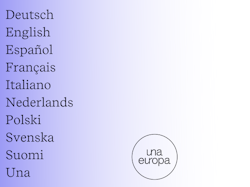Ahead of European Day of Languages on 26 September, we spoke to Adele David from the University of Edinburgh's Study and Work Away (SWAY) team. SWAY joined forces with colleagues from other Una Europa partners over the summer to pilot new virtual ways of language learning.
Together with your Una Europa partners, you launched eTandem Global this August. What is this all about?
eTandem Global is a virtual language exchange programme to allow students from the University of Edinburgh and partner universities to practice their language skills at a time where physical mobility has become a challenge, due to the Covid-19 health crisis. Students signing up for eTandem will be matched with a language partner, allowing them to improve their language skills in a fun, informal environment, while learning about another culture first-hand.
The programme will be fully supported by the SWAY service at the University of Edinburgh, with an online Welcome event and ongoing support, but students will retain a great degree of autonomy, and can tailor their language interactions with their partners to suit their own requirements and personal interests.
How did you work with your Una Europa partners to make it happen?
We first assessed the level of interest from our own Language students, then emailed our partners to invite their students to register for the programme. We were very interested in hearing from partners who might have already implemented a similar online language exchange, and to learn from them to improve eTandem Global. The Una Europa alliance is a great way to share this kind of initiative, which is based on partner collaboration across Europe.
What are the next steps? Are students already working together?
Registrations are currently open for students until 28th September. Following the registration, students from the University of Edinburgh and from partners will be matched in pairs, based on language and personal preferences.
Once students have been matched, we will also look launch online “Language cafes” in small groups. eTandem participants will also be invited to our eTandem Facebook groups and to an online Welcome session, so we are hoping to create a real sense of community through the programme.
What has been the response so far?
We have received a high level of interest in eTandem, both from partner universities and within our own schools. We are hoping to match about 400-450 students studying a variety of languages in the first instance.
There is a real appetite for virtual opportunities that still offer a first-hand experience of another culture. eTandem will give students the opportunity not only to improve their language skills, but also to create a connection with someone from another country and gain a unique perspective on their culture and daily life.
Is there still an opportunity for students to register? Will the scheme re-open?
Students can register by Monday 28th. We might also have a second round of applications in October if spaces are still available. eTandem Global will initially run in semester 1 2020/21, but might extended beyond if there is enough interest from students and partner universities.
Interview by Inga Odenthal, Una Europa



